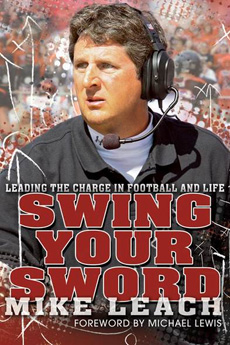| HOME | BIO | THE QB: THE MAKING OF MODERN QUARTERBACKS | SWING YOUR SWORD | MEAT MARKET | CANE MUTINY | CONTACT |

Swing Your Sword (excerpt) |
|
When I was 17 I earned an academic scholarship to the University of Wyoming. I turned it down to attend Brigham Young University in Utah instead. I was raised a Mormon, and though that was a factor in choosing BYU, it was not a big factor. Your religion is your religion no matter where you go. I wanted a change of scenery. BYU literally had students from everywhere. They have one of the biggest international programs in the world. I liked that the school had such a strong academic reputation. I also liked the fact that it was 10 hours away from home. I figured if I took the academic scholarship to Wyoming, it would've been an environment similar to what I already knew from high school. In college, I wanted to meet, know, and grow to understand a wide variety of people. I'd ask all sorts of questions to strangers on the street just to see their reactions. It was like a cross between an interview and an interrogation. I'd ask them questions, which may have included what kind of music they liked, what their favorite food was, what their love life was like. I've never viewed any question to be too personal. My freshman year, I wrote a folklore paper on prank phone calls. I got so into it that I wrote up about 60 prank calls. I would also dial up random numbers. I wouldn't say anything really offensive. I'd start talking: "So what are you doing? What's going on?" They'd ask, "Do I know you?" "No. I doubt it. I just randomly dialed this number and I figured I'd introduce myself and talk to you." Some would get nasty or just hang up. I wanted to see how long I could keep them on the phone. Usually, I'd end up chatting with them for a while. I had this one lady who was in her late 20s on the phone for two hours. She'd gone to BYU. Her husband was working on some graduate degree. She started telling me which teachers to take in which courses. She told me all about her husband, and we just went on and on. I'd never met her in person. I'd never even talked to her before that conversation, nor have I since. It was a fishing expedition to see what I could catch, born more out of curiosity than boredom. I really wanted to broaden my horizons as much as possible. When I returned to Cody in the summer, I felt like I came back a different person. I was more independent. I realized that any problem I was faced with—whether it was money-related, academic-related, or anything else—only one person is gonna have the solution, and that was me. It was then that I realized that your choices come down to either ducking your head and running, or stepping up and attacking your obstacles aggressively. My parents weren't paying for my schooling. I was determined to pay for college so my summers were packed. I was getting about $600 a semester in scholarship money. I had jobs painting and working at a hotel. Plus, I was coaching baseball, which I really loved.
I always wondered what Coach McDougall thought of that whole ghost infield deal. He was one of the most intimidating people in the entire world. He was like 5-foot-10, 230 pounds, and had the face of vicious intensity. His dad was a sheriff named Pee Wee McDougall. That ghost infield deal certainly wasn't his style. This was the summer after my freshman year at BYU. The team I was coaching was my little brother Tim's Babe Ruth All- Star team, who was hosting a regional baseball tournament in Cody. There were teams from Washington, Montana, Idaho, and Oregon. We were not very good. To be honest, we stunk. We were in so far over our heads. The boys were totally down and I don't think anyone besides me wanted to coach. Every other state had a higher population than Wyoming's, and to be fair, we hadn't even earned the right to play in the tournament (in Babe Ruth baseball if you host the tournament, you automatically qualify). We didn't have to beat anyone to get into it: We didn't play in a district tournament, we didn't play in the state tournament, but we're in this regional tournament playing against tested state champions. My friend Mike Clayton, who played baseball at BYU, told me about doing this ghost infield once, and thinking about it I figured there was no sense in showing how bad we were during warm-ups. Plus, I wanted to get our kids really pumped up to play. I would stand up there with the bat and toss the invisible "ball" up in the air, glance at it and then swat at the "ball" like I was hitting a grounder to third. The kid playing third base would uncoil from his stance, take a few quick steps to his left, scrunch down like he was fielding the ball, then pop up and throw it over to first. And so we went around the whole infield like that, faking it. Then the team really got into it. Instead of making the routine plays, they're making all of these super baseball highlight plays. They're going deep into the hole and diving for balls and laying out. Everybody on the team, in the dugout, even in the stands loved it. They're laughing and getting all fired up. We ended up winning a game before we got eliminated from that tournament. I liked BYU. Everything was clean. The place is like Disneyland, only without the rides and merchandising. If you dropped something, someone immediately raced over to pick it up. I also really like that BYU has people from all over the world there. The negative would be all of the rules. For example, one time I went to a bowling alley and some random guy thought my hair wasn't short enough. He turned me in to the honor police. It was like that all the time. I had to deal with a certain amount of uptight judgment at BYU. It's just the way my head is formulated. I mean the shape, not necessarily what's inside. I had the same haircut since I was eight years old. The whole deal about haircuts and hair length at BYU was foolish. It was an overreaction to the '60s. The first time I was called in by the honor police, I noticed a copy of the student newspaper around campus that had a story on this professor, Omar Kader, who was born to Palestinian immigrant parents in Provo, Utah. The story was about some award he'd won. Accompanying the article was a picture of him. His hair was as long as mine. When I got my notice from the honor police that said I had to come in, I mailed the note back to them with a copy of the picture of Omar Kader from our newspaper. I said, "Here we have a professor we should all be proud of, and his hair looks great, and mine looks like his. This should take care of it." I still had to go to see them. The Honor Code Police just stared at me with this mortified look on their faces, like I'd started trimming my toenails in front of them. I even referred to the statue of Brigham Young in the quad that I walked by every day. "I look at that statue with admiration, and I've noticed [Brigham Young's] flowing hair also. I'm not asking that mine be that long, but why are we fussing about this?" They weren't buying it. I couldn't help but think, "Why worry about rat turds when there are elephant turds flying around everywhere?" They responded with something about how one gnat can sink the whole boat. They insisted that my hair had to be styled above my ear and collar. "Well fine, I'll style it and jam it above my ear. How about if I get hair spray and stick it up like Bozo the Clown or get some bobby pins?" When I was gone they called Omar Kader. I heard they gave him a lecture about how he set a bad example that led me astray. I called him to explain. The next semester I took one of his classes. He was a good professor. I liked him a lot. It was by no fault of his that I was called in about the Honor Code. I was called in four times and I never changed my hair once. For as much as I liked the place, I do think the rules being so tight at BYU can inhibit creativity. I was certainly never a fan of the hair thing. I had my periods of civil disobedience, but I can admit that I was more focused there than I may have been if I'd gone anywhere else. I've always been regarded as an independent guy, but beneath it all there is structure. BYU was very much a part of building that side of me. I don't think all of that would've come together without it. Not to mention I ended up meeting and marrying a great lady named Sharon, who had been living in the next building over from my apartment, just a few hundred feet from me. |
